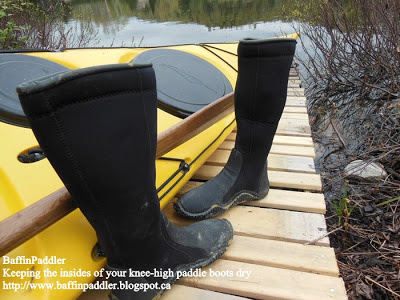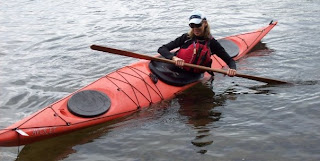"How do you keep your paddle boots from getting smelly . . . ?"
Well, this certainly is not a sexy, or alluring kayaking topic. I won't make you look at too many pictures of ugly paddle boots on this blog. Beautiful pictures of spring tulips and Ottawa's Parliament buildings will follow soon enough, I promise.
But, some people ask me, "How do you keep your paddle boots from getting all smelly?"
I find this a funny question. How would anyone know that my paddle boots and booties aren't all smelly?
I've never had the courage to stick my nose in any of them. But for this post, I finally did. And I tested the worst offenders and collectors of damp, dank odours: My knee-high paddle boots. The hardest boots to vent, air, and dry.
Usually, in the summer, we just park our paddle booties and boots outside in the hot sun to bake and dry after a good paddle. And it usually works to dry them quickly and helps keep them odour free.
When rain, fog, or cold spring or fall weather hits, we don't have the hot sun to dry our boots. After a paddle, wet paddle boots and booties can stay wet for days. Leaving them closed up in a gear bag is a real mistake. This is usually what makes them smelly, or worse, mouldy.
Also, what seeps into your boots and booties from swampy, silty, or muddy shorelines doesn't help.
It's important that the soles of the knee-high boots don't leak like a sieve when you step into the water. If they do, like mine did when I first bought them, they'll pick up, and retain more odours that have nothing to do with your feet!
It's easy to rinse out and wash short ankle paddle booties, or to evacuate water from them while paddling in the summer. It's a lot more work and a bigger challenge when your paddle boots are knee-high! We wear knee-high boots for protection, dry feet, and warmth in colder temps.
In another post, I'll call out the popular paddle boot and bootie maker who manufactured my knee-high paddle boots. Brand new, they leaked like crazy at the soles in a few inches of water. It was miserable. The boots were useless. But, I'll tell you what I had to do to fix them. It was miserable too. And you can avoid buying them. They weren't defective. Just poorly made. A paddle friend with another boot brand said, "My boots don't leak."
July 4th update: Here's the link to the post about the response from the leaky paddle boot maker
Leaky Gul knee high paddle boots
If you've got a house with forced-air and floor vents, it's easy to prop paddle booties and boots throughout the house over the floor vents up-side-down to dry them out. This works great. They dry quickly. It doesn't look very pretty when friends come over for dinner. If they're paddlers, they won't even notice or care.
But, in a house with electric wall heaters, drying out knee-high paddle boots is a challenge.
It's so great to slip your bare feet into dry paddle boots every time you paddle, especially in spring while stepping out into cold water, launching from shorelines with silty lake or river bottoms, walking along muddy or wild shorelines with prickly plants that can irritate and bite.
Knee-high paddle boots are awesome . . . when they're dry inside each time you put them on, it's joy!
Neo paddle boots gather a bit of moisture from your feet and leg as you paddle. Here's how I dry out and air my knee-high paddle boots from foot to calf after day paddles or after a multi-day trip.
It's simple, inexpensive, and it works well for me!
Roll up two clean dry wash cloths and stuff one down into each foot - toe to heel. I use dark brown wash cloths in the foot so that I don't discolour a good wash cloth.
Roll up two small clean towels, hand towels, or clean pillowcases and stuff one into each boot from the ankle to the calf so that the boot stands up by itself and doesn't fold over. This helps it air out and absorbs moisture from inside.
That's it. Overnight, the cloths absorb moisture from inside the boots and helps them air.
The next day, remove the damp cloths, scatter them somewhere to dry while you stick your feet into dry or barely damp boots and enjoy a good paddle.
To freshen the insides of your boots, you can sprinkle a foot powder into the cloths before stuffing them down into your paddle boots.
You don't want to sprinkle foot powder directly into your paddle boots - you'll have nothing but thick, wet paste in there.
I keep reusing the cloths for my knee-high paddle boots until my nose tells me it's time to throw them into the wash.
You can even put the cloths into the dryer before you stuff them into your paddle boots to help dry out your boots - but then, you'd be accused of being a real "Paddle Princess or Prince." I haven't tried that yet, but it's very tempting . . .
Happy paddles. My nose and feet tell me it's all good!
The BaffinPaddler
But, some people ask me, "How do you keep your paddle boots from getting all smelly?"
I find this a funny question. How would anyone know that my paddle boots and booties aren't all smelly?
I've never had the courage to stick my nose in any of them. But for this post, I finally did. And I tested the worst offenders and collectors of damp, dank odours: My knee-high paddle boots. The hardest boots to vent, air, and dry.
Usually, in the summer, we just park our paddle booties and boots outside in the hot sun to bake and dry after a good paddle. And it usually works to dry them quickly and helps keep them odour free.
When rain, fog, or cold spring or fall weather hits, we don't have the hot sun to dry our boots. After a paddle, wet paddle boots and booties can stay wet for days. Leaving them closed up in a gear bag is a real mistake. This is usually what makes them smelly, or worse, mouldy.
Also, what seeps into your boots and booties from swampy, silty, or muddy shorelines doesn't help.
It's important that the soles of the knee-high boots don't leak like a sieve when you step into the water. If they do, like mine did when I first bought them, they'll pick up, and retain more odours that have nothing to do with your feet!
It's easy to rinse out and wash short ankle paddle booties, or to evacuate water from them while paddling in the summer. It's a lot more work and a bigger challenge when your paddle boots are knee-high! We wear knee-high boots for protection, dry feet, and warmth in colder temps.
In another post, I'll call out the popular paddle boot and bootie maker who manufactured my knee-high paddle boots. Brand new, they leaked like crazy at the soles in a few inches of water. It was miserable. The boots were useless. But, I'll tell you what I had to do to fix them. It was miserable too. And you can avoid buying them. They weren't defective. Just poorly made. A paddle friend with another boot brand said, "My boots don't leak."
July 4th update: Here's the link to the post about the response from the leaky paddle boot maker
Leaky Gul knee high paddle boots
If you've got a house with forced-air and floor vents, it's easy to prop paddle booties and boots throughout the house over the floor vents up-side-down to dry them out. This works great. They dry quickly. It doesn't look very pretty when friends come over for dinner. If they're paddlers, they won't even notice or care.
But, in a house with electric wall heaters, drying out knee-high paddle boots is a challenge.
It's so great to slip your bare feet into dry paddle boots every time you paddle, especially in spring while stepping out into cold water, launching from shorelines with silty lake or river bottoms, walking along muddy or wild shorelines with prickly plants that can irritate and bite.
Knee-high paddle boots are awesome . . . when they're dry inside each time you put them on, it's joy!
Neo paddle boots gather a bit of moisture from your feet and leg as you paddle. Here's how I dry out and air my knee-high paddle boots from foot to calf after day paddles or after a multi-day trip.
It's simple, inexpensive, and it works well for me!
Roll up two clean dry wash cloths and stuff one down into each foot - toe to heel. I use dark brown wash cloths in the foot so that I don't discolour a good wash cloth.
Roll up two small clean towels, hand towels, or clean pillowcases and stuff one into each boot from the ankle to the calf so that the boot stands up by itself and doesn't fold over. This helps it air out and absorbs moisture from inside.
That's it. Overnight, the cloths absorb moisture from inside the boots and helps them air.
The next day, remove the damp cloths, scatter them somewhere to dry while you stick your feet into dry or barely damp boots and enjoy a good paddle.
To freshen the insides of your boots, you can sprinkle a foot powder into the cloths before stuffing them down into your paddle boots.
You don't want to sprinkle foot powder directly into your paddle boots - you'll have nothing but thick, wet paste in there.
I keep reusing the cloths for my knee-high paddle boots until my nose tells me it's time to throw them into the wash.
You can even put the cloths into the dryer before you stuff them into your paddle boots to help dry out your boots - but then, you'd be accused of being a real "Paddle Princess or Prince." I haven't tried that yet, but it's very tempting . . .
Happy paddles. My nose and feet tell me it's all good!
The BaffinPaddler










Well, I don't wear paddling "boots" - I wear paddling "shoes!" For me, a quick scrubbing in soapy water, rinse, and sun dry usually does the trick! However, even with this care, most of my paddling shoes will only last a couple of seasons before it's time to purchase a replacement pair!
ReplyDeletePerhaps one day Mike you will know the joys of a good knee high boot. When they don't leak at the soles, they are wonderful for all the reasons I mentioned - stepping out into icy cold water, cold temperatures, mud, and silt - and your feet stay dry and clean and warm!
ReplyDeletePlus, the snapping turtles can't get at my bare ankles if I surprise one, and I'm protected from the poison ivy on some shorelines. This is Canada!
I only wear paddling shoes on hot summer days.
Cheers.